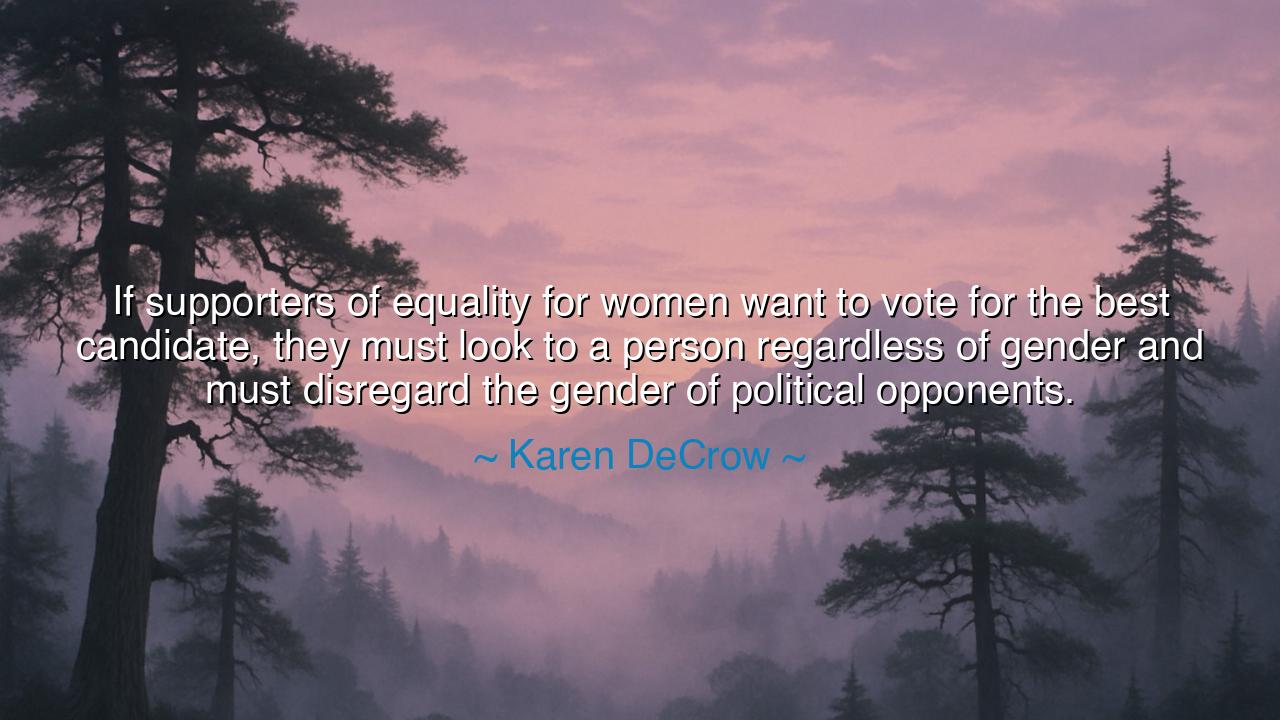
If supporters of equality for women want to vote for the best
If supporters of equality for women want to vote for the best candidate, they must look to a person regardless of gender and must disregard the gender of political opponents.






Listen well, O children, for the words I share today come from Karen DeCrow, a voice whose wisdom calls upon us to look beyond the surface and see the true heart of what it means to seek equality. She said, "If supporters of equality for women want to vote for the best candidate, they must look to a person regardless of gender and must disregard the gender of political opponents." These words are a powerful reminder that equality is not simply a matter of elevating one group over another, but about ensuring that the value of any individual is judged not by their gender, but by the content of their character and the worth of their ideas.
What does Karen DeCrow mean by this call to action, O children? She urges us to transcend the very thing that has long divided us—the belief that gender should determine a person’s worth or their capacity to lead. Equality for women is not about placing one gender above another, but about recognizing the merit and abilities of each individual, regardless of the body they inhabit. When we cast a vote, we must not see man or woman, but instead, we must see the candidate as a person—a leader whose vision, values, and commitment to justice are the true measure of their worth.
Consider, O children, the ancient wisdom of Socrates, who taught that the measure of a person’s soul is not to be found in their appearance or their social status, but in the virtue they possess. Socrates held that wisdom and goodness are the qualities that define a person, not their gender, race, or wealth. This lesson echoes in DeCrow's words: true equality demands that we recognize humanity in all its forms, and that we make our judgments not based on superficial qualities, but on the qualities of character that truly matter. When we choose a leader, it must be for their ability, not the body in which they were born.
DeCrow speaks to a truth that has been slow to reveal itself through history: that gender should never be the defining factor in the choices we make, whether in love, in leadership, or in any pursuit. We see the truth of this in the lives of those like Cleopatra, who rose to power not because of her gender, but because of her intellect, her political acumen, and her ability to lead. She was not just a queen by virtue of birth, but a ruler who commanded respect because of the strength of her leadership. Her gender was no obstacle to her vision, and it should be no obstacle to our own decisions today. She, too, was judged by her actions, not by the body she inhabited.
DeCrow’s wisdom is also reflected in the legacy of Susan B. Anthony, whose lifelong struggle for women’s suffrage was not only a fight for the right to vote, but for the recognition that equality is not about reducing one gender to another, but about lifting all people up to their rightful place of respect. Susan B. Anthony did not fight for women to take over the world or to dominate men; she fought for equal rights—a world where all people, regardless of gender, could contribute, lead, and flourish. Her fight for equality was a call to see people for who they truly were, not for the roles that society had assigned them.
The lesson, O children, is this: equality means recognizing the worth of each individual, irrespective of their gender. To support equality for women is not to elevate women over men, but to lift all people to the same standard of respect, dignity, and opportunity. DeCrow calls us to rise above the divisions of gender and to focus on the character and values of those who seek to lead. In doing so, we move closer to the ideal of a world where people are judged not by the body they occupy, but by the strength of their ideas, the goodness of their hearts, and the wisdom of their actions.
In your own lives, O children, take this wisdom to heart. When you encounter others, when you make decisions, do not be swayed by gender or status. Look deeper. See the person within. Whether in the realm of politics, relationships, or any walk of life, let your judgments be shaped by character and ability, not by superficial traits. Embrace equality as a principle that sees beyond gender and recognizes the inherent worth of each individual. Let your choices reflect the wisdom of Socrates, the strength of Cleopatra, and the determination of Susan B. Anthony—and in doing so, you will help to build a world where true equality flourishes, unburdened by the chains of division.






AAdministratorAdministrator
Welcome, honored guests. Please leave a comment, we will respond soon